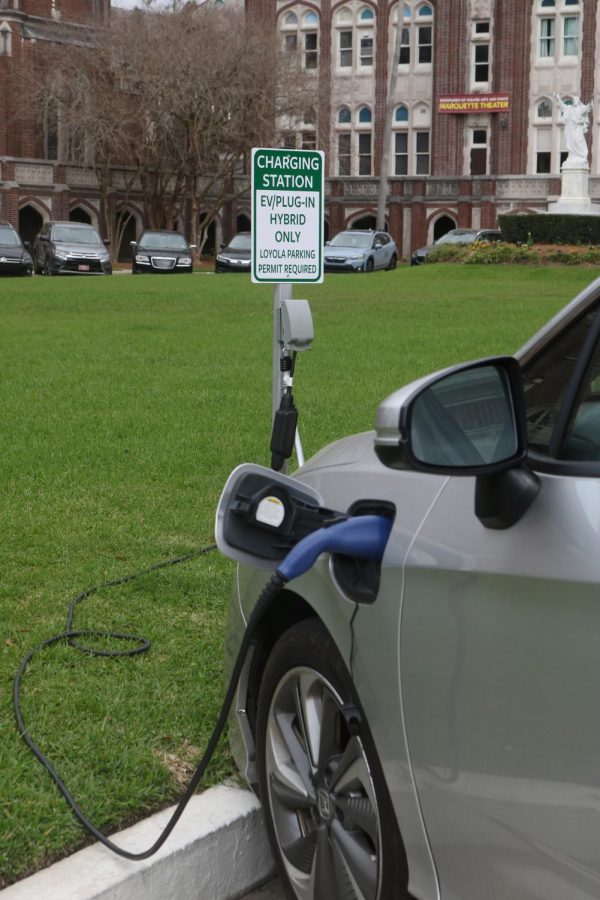OPINION: EV charging stations help Loyola serve the environment
An electric car is getting charged up on Loyola’s campus. Loyola has set up 11 additional charging stations like this one.
March 11, 2023
As one of a handful of electric vehicle drivers on campus, I was excited to see the new dedicated charging spaces pop up across campus this week.
EV charging stations aren’t new to Loyola. We have had a few charging spaces on the main campus since 2011. Those level 2 chargers are still in the Horseshoe, but now they have been supplemented with 11 additional level 1 charging spaces spread throughout campus.
As I have been excitedly talking about these charging stations to people on campus, I have been met with a curious chorus — ranging from indifference to resentment.
But resenting an EV parking space is thinking about it all wrong.
An EV parking space is not a giveaway that you are being left out of. It is an investment in climate change.
Because they are still relatively rare, most people just don’t understand EVs, so let me explain a little about them.
First, I have had my EV since 2018, and I can assure you, I have never run out of charge on the side of the road. Range anxiety is understandable because it is still a new technology, but once you drive an EV, you will quickly learn that there are more than enough places to charge, and you typically have more than enough power when you need it.
Second, charging an EV during the day isn’t about trying to get Loyola to buy us gas. No, charging during the day is about generating less CO2 emissions, specifically by shifting the time of day that the vehicle is charged.
Charging during the day is about reducing the carbon impact for everyone — and reducing the stress on the power grid.
Here’s a little math to show you what I mean. A gallon of gas creates 43 percent more carbon dioxide emissions than the comparable amount of electricity generated by natural gas — which is where most of Entergy’s generation in the evening comes from.
On the other hand, if the vehicle is charged during the day, when more of that electricity comes from renewables because solar power is being generated —the carbon impact is even smaller.
Charging at Loyola is not about saving money. Each time someone plugs in to one of Loyola’s EV spots, they are getting just a few dozen cents worth of electricity. If this was about saving money, the best move would be to just forego the parking pass, park off campus, and just charge at home.
EVs make a huge difference in our carbon impact, and charging them during the day, rather than in the evening, multiplies their impact for the whole planet.
Installing these EV charging spaces is a visible and meaningful way Loyola is able to make an investment in decarbonization every day.
Why does it matter that it is visible? Well, recruitment, for one.
The Association for the Advancement of Sustainability in Higher Education conducted a survey that showed that 85 percent of incoming college students say it is at least somewhat important for their campus to prioritize sustainability, with 45 percent saying they considered environmental sustainability in their enrollment decisions.
By putting those spaces front and center, Loyola is showing its concern for the environment.
And EV spots are going to play an increasingly important role. That is because EV sales grew
by two thirds in 2022 in the U.S., and are expected to continue to make up an increasing share in the coming years as prices continue to come down.
Cost is another sore subject. I know there are a lot of misconceptions about the upfront costs of EVs, but EVs aren’t just for the rich and privileged. EVs aren’t just pricy and flashy Teslas anymore.
Nowadays, you can buy perfectly fine electric Chevys, Toyotas, Hyundais, and more, and many of them are priced competitively with other new vehicle models. If you buy the vehicle new, you can get a 036;7,500 federal tax credit to bring the price even further down.
OK, sure, new vehicles, by their very nature, price most people out of the market. But since the Inflation Reduction Act, even used EVs qualify for tax credits. So, for example, you can get a 2013 Nissan LEAF all-electric for less than 036;10,000, and that is before the 036;4,000 tax credit.
Of course, everyone can’t purchase a vehicle. That is true whether you are talking about an EV or not. But the misconception that all EVs are luxury brands for the bougie is just an outdated idea.
I will admit that having these new EV charging spots in such prominent places on campus is a bit embarrassing. I, along with the other EV drivers on campus, would have been more than happy to have them installed on the seventh floor of West Road, out of the way of everyone else.
But the university decided to make a public and visible commitment to the environment, and I salute that.
If you are grumpy about not having enough parking, don’t take it out on a good cause, like decarbonizing the economy. Take it out on all the Tulane students who are buying our parking passes.
I think we can all agree that green cars are better than Green Waves anyway.









